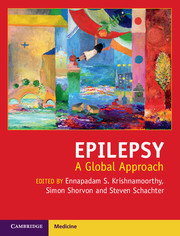Epilepsy A Global Approach
Langue : Anglais
Coordonnateurs : Krishnamoorthy Ennapadam S., Shorvon Simon D., Schachter Steven C.

This transcultural comparison of scientific knowledge and clinical experience provides a framework for a global health policy for epilepsy.
This comprehensive, multidisciplinary approach to epilepsy compares and contrasts scientific knowledge, clinical experience and social consciousness between Western and non-Western cultures, enhancing transcultural understanding and providing a paradigm for an integrative, truly global health policy for this disorder. Topics covered include pharmacological and non-pharmacological management of epilepsy; care models and traditional medical systems; service organization in resource-limited countries; cultural perspectives on consequences of epilepsy; social, anthropological, economic, political, and spiritual issues related to living with epilepsy; infectious and non-infectious causes and risk-factors; region-specific syndromes. Uniquely drawing attention to both a medical perspective and the burden of living with epilepsy, this is a must-have reference work for epileptologists, neurologists, epidemiologists, medical policymakers and health administrators in both the developed and developing world.
Part I. Editorial Introduction: 1. Epilepsy: the global burden and transcultural issues; Part II. Infective Causes of Epilepsy: 2. The non-infective causes of epilepsy; 3. Infectious causes of epilepsy: NIMHANS experience and review; 4. Infectious causes of epilepsy: cerebral malaria; 5. Infectious causes of epilepsy: cysticercosis in South America; Part III. Consequences of Epilepsy: 6. Physical consequences of epilepsy; 7. Quality of life and the stigma of epilepsy; 8. Neuropsychiatric consequences of epilepsy; 9. Cognitive consequences of epilepsy: a global perspective; 10. Naming epilepsy: culture-specific perceptions of epilepsy; 11. Knowledge, attitude and practice toward epilepsy; 12. The economic burden of epilepsy in China; Part IV. Comprehensive Epilepsy Care: 13. The clinical approach to investigation and service organization of epilepsy care in low- and middle-income countries; 14. Comprehensive epilepsy care: insights from care models in LAMICS: Latin America; 15. Comprehensive epilepsy care: transcultural issues and the development of a best practice model in India; 16. Comprehensive epilepsy care in China; Part V. The Medical Management of Epilepsy: 17. The medical management of epilepsy: basic principles; 18. The medical management of epilepsy: choice of drugs; 19. The medical management of epilepsy: use of generic drugs; 20. The medical management of epilepsy: antiepileptic drugs and children; 21. The medical management of epilepsy in low- and middle-income countries; 22. The challenge of epilepsy in low-income countries: insights from Laos; 23. Integrated thought: medical management of epilepsy; Part VI. The Surgical Management of Epilepsy: 24. Epilepsy surgery in high-income countries: the example of Great Britain; 25. Models of epilepsy surgery in a large LAMIC: ideal and pragmatic; 26. Models of epilepsy surgery in a large LAMIC: Sree Chitra Tirunal Institute, India; 27. Setting up an epilepsy surgery service in Malaysia; 28. Ideal and pragmatic models of epilepsy surgery in a large LAMIC; 29. Integrated thought: epilepsy surgery; Part VII. Non-Pharmacologic Management of Epilepsy; 30. Non-pharmacologic and psychological management of epilepsy in developed countries; 31. Ayurveda and yoga in the management of epilepsy; 32. Traditional Chinese medicine in the management of epilepsy; 33. Traditional medicine in the management of epilepsy in Ghana; 34. Complementary and alternative medicine in the management of epilepsy: a global perspective; 35. Integrated thought: non-pharmacologic management of epilepsy; Part VIII. Epilepsy Issues with Global Health Impact: 36. The epilepsy treatment gap; 37. Intractable epilepsy: implications with regard to LAMICs; 38. Epilepsy and intellectual disability; 39. Legal implications of epilepsy and epilepsy management; 40. The global campaign against epilepsy; 41. Integrated thought: issues with global health impact; Part IX. International Perspectives: 42. Perspectives on epilepsy in Tibet; 43. Perspectives on epilepsy from Asian-American populations living in the USA; 44. Perspectives on epilepsy in The Lebanon; 45. Perspectives on epilepsy in the Philippines; 46. Integrated thought: international perspectives.
Ennapadam S. Krishnamoorthy is Founder and Director of Neurokrish and Trimed, and Adjunct Professor at the Public Health Foundation of India.
Simon Shorvon is Professor in Clinical Neurology and Clinical SubDean at the Institute of Neurology, University College London, and Consultant Neurologist at the National Hospital for Neurology and Neurosurgery, London.
Steven Schachter is Professor of Neurology at Beth Israel Deaconess Medical Center, Massachusetts.
Simon Shorvon is Professor in Clinical Neurology and Clinical SubDean at the Institute of Neurology, University College London, and Consultant Neurologist at the National Hospital for Neurology and Neurosurgery, London.
Steven Schachter is Professor of Neurology at Beth Israel Deaconess Medical Center, Massachusetts.
Date de parution : 04-2017
Ouvrage de 232 p.
19.5x25.3 cm
Thème d’Epilepsy :
© 2024 LAVOISIER S.A.S.



